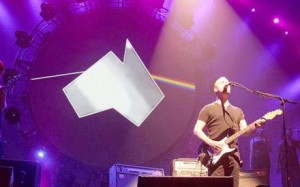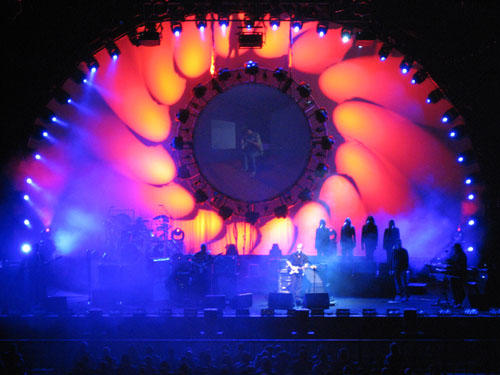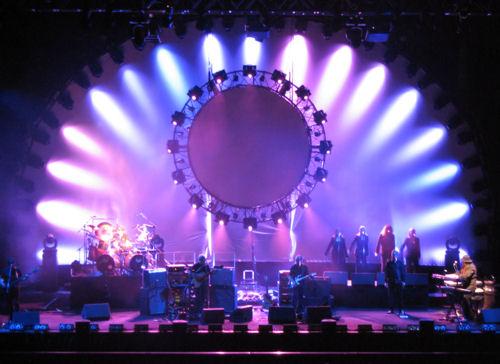Music Interview: Dogs, Sheep, Pigs, and Kangaroos with The Australian Pink Floyd Show’s Jason Sawford
Not only is TAPFS considered the best Pink Floyd tribute band, but it is argued that they are the best cover band in the world.
By Alex Smallridge
Pink Floyd is one of the most respected and beloved rock bands in the world with devoted fans who continue to call for their music, even 15 years after their breakup.
This devotion has spawned tribute bands whose sole purpose is to give an audience the experience of a Pink Floyd concert. Of these tribute bands, The Australian Pink Floyd Show (TAPFS) reigns supreme.
Not only is TAPFS considered the best Pink Floyd tribute band, but it is argued that they are the best cover band in the world. I recently spoke with Jason Sawford, keyboard player for TAPFS.
TAPFS will play at the Wang Theater in Boston on Wednesday November 2nd.
Arts Fuse: Why did you decide to be a Pink Floyd band?
Jason Sawford: When we first started, tribute bands were a new thing; I hadn’t even heard of them.
In 1988, some guy, some Pink Floyd fanatic, wanted to start a band. And looking at it, I thought it was an interesting project and I went along with my synthesizer and said hello and it started from there.
It’s really just a bunch of guys who got together to play Pink Floyd for enjoyment. It was a very small thing when tribute bands were just starting out really.
AF: You never expected to become this popular?
JS: No, no. I mean, I was at university doing biochemistry and genetics, and I was planning to become a scientist of some sort, but I ended up being a musician in a Pink Floyd Tribute band.
AF: Any regrets about not following science?
JS: I’m still interested in science. But I don’t regret doing what I do. I’m very happy doing what I’m doing. It’s very interesting, and it’s taken me all over the world.
AF: What is it like being a primarily live band?
JS: I think it’s a bit like being a classical musician. You play another composer’s music, which is something musicians have always done . . . I don’t see it as a lot different from that. So, whereas I think bands write music and it’s an interesting thing to do to be able to write music, playing music is also very satisfying.
AF: Do you ever want to make your own music?
JS: We’d be happy to do that. We did start out writing an album originally and various individuals in our band have done their own original projects or played in other bands, so there is some interest in it. But obviously, these Pink Floyd shows have become so successful that that takes up a lot of our time.
AF: How does the Australian aspect of your identity factor in to your music?
JS: It’s just occasional references. We have the pink kangaroo like the pink pig. We might insert a little reference to Australia or something in an Aussie accent. It’s just a small bit of humor that we like to inject. It’s just a way to get out our brand or a certain identity because we aren’t Pink Floyd, we’re a tribute to Pink Floyd.
AF: How did the pink kangaroo come to be?
JS: It started out as a t-shirt design when Colin, our bass player, designed our t-shirt, which altered the power station from Animals and that image has a pink kangaroo on it, which was substituted for the pig, and it started from there. It became an image that we started using. Occasionally, it would appear in our animation or advertising material or on brochures and things, little trademark things. And then we had the idea of using a pink kangaroo inflatable.
AF: What are your favorite songs and the most difficult songs to play?
JS: There are a lot of challenges in trying to get everything right. I think the most difficult one, for me personally because there’s a lot going on keyboard wise, is “Sheep.” It’s a very rocky song and there are a lot of fast changes and sounds and that’s quite difficult to pull off and do right live because things can go wrong.
I love playing songs like “Shine On You Crazy Diamond” and “Dogs;” a lot of those epic songs are very enjoyable and they are my favorites to play.
AF: Do you improvise and play with the music at all or do you stick to Pink Floyd?
JS: We’re pretty strict when we follow the album. We try to make it sound like the album, to make it sound like Pink Floyd . . . and that requires focus and discipline. You have to sit there and figure out how to get a certain sound.
And that requires a discipline in itself. And maybe a piece of music calls for it. There might be some early piece that we might slightly improvise a bit more. If Pink Floyd jammed, then we might jam on it.
But we’re pretty strict in trying to follow what they themselves wrote rather than what ourselves write. It’s very much about trying to make it sound like Pink Floyd. That is the objective of it.
AF: Do you guys ever have a desire to personalize the music?
JS: It’s not a question of personalizing; it’s a question of making it sound like Pink Floyd. It’s not about us, it’s about Pink Floyd. We’re not setting out to personalize it. Occasionally we might insert a little card of reference to us as a sort of joke, a bit of tongue in cheek, but it’s very much about Pink Floyd, so it’s not about us doing our own versions of it.




